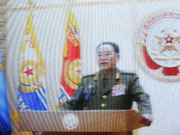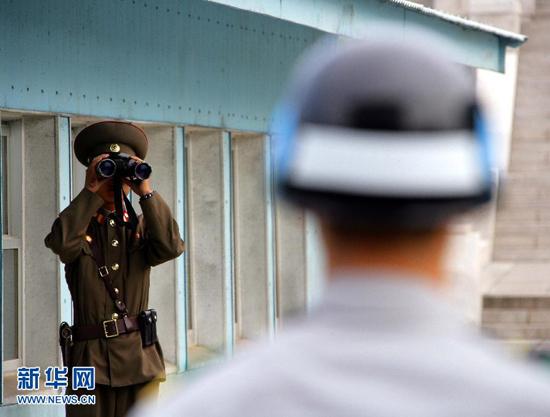DPRK to nullify Korean War armistice agreement

 0 Comment(s)
0 Comment(s) Print
Print E-mail CNTV, March 6, 2013
E-mail CNTV, March 6, 2013
The supreme military command of the Democratic People's Republic of Korea says it will nullify the Korean War Armistice Agreement starting from next Monday. That's the same day South Korea and the United States had planned to stage a joint military drill.
 |
|
The supreme military command of the Democratic People's Republic of Korea says it will nullify the Korean War Armistice Agreement starting from next Monday.?[Xinhua] |
The DPRK has also decided to halt the work of its delegation at Panmunjom, where the DPRK and South Korean delegates usually meet for communication and negotiations.
A Korean People's Army officer has said on state TV that the DPRK will nullify the armistice agreement once the joint South Korea-US exercise starts.
DPRK Military Officer said, "We will completely nullify the effectiveness of the Korean armistice, which exists as a formality, once the war exercise moves into the full-out stage on March 11."
South Korean and US forces are set to start a two-week war game dubbed the "Key Resolve" to enhance defense readiness on Monday.
The DPRK officer also said the Korean People's Army would carry out more and stronger counter-measures in response to the US and South Korea's "hostile" policies.
He said the DPRK will retaliate if it's threatened with nuclear weapons.
|
|
|
The supreme military command of the Democratic People's Republic of Korea says it will nullify the Korean War Armistice Agreement starting from next Monday.?[Xinhua] |
DPRK Military Officer said, "If they are threatening us with nuclear weapons, we will retaliate with a more powerful and precise attack by nuclear weapons. This is our unchanged stance, and a powerful way of responding by our military and our people."
The Korean War Armistice Agreement was signed by the US and the DPRK in 1953 to "insure a complete cessation of hostilities and of all acts of armed force in Korea until a final peaceful settlement is achieved". The signed armistice restored the border between the two nations near the 38th parallel, created the Korean Demilitarized Zone, and put into force a cease-fire.
However in 2009, the DPRK unilaterally withdrew from the armistice, as South Korea announced it was joining in the Proliferation Security Initiative.
Meanwhile in 2010, DPRK delegates said at Panmunjom the country would not accept the armistice as binding if a US-South Korea joint military drill took place.






